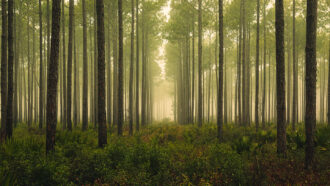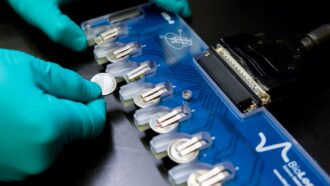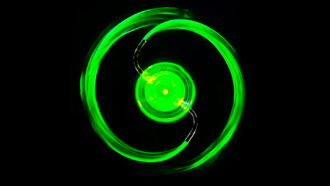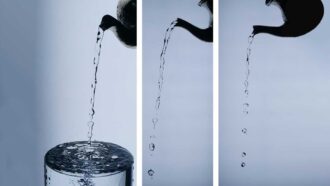
Emily Conover
Physics, Senior Writer, Science News
Physics writer Emily Conover loves physics for its ability to reveal the secret rules about how stuff works, from tiny atoms to the vast cosmos. Before becoming a science journalist, she studied physics at the University of Chicago. There, she investigated the weird ways of tiny particles called neutrinos. She has previously written for the Milwaukee Journal Sentinel, Science Magazine and the American Physical Society. She is a two-time winner of the D.C. Science Writers’ Association Newsbrief award.

All Stories by Emily Conover
-
 Space
SpaceMicroscopic black holes may be flying through our solar system
These flybys could jostle the orbits of planets and satellites as teeny black holes whiz by us once a decade or so.
-
 Earth
EarthThunderstorms churn up a ‘boiling pot’ of high-energy gamma rays
A thunderstorm seen in gamma ray vision plays out as a complex, frenzied lightshow above the clouds.
-
 Artificial Intelligence
Artificial IntelligenceTwo AI trailblazers win the 2024 Nobel Prize in physics
John Hopfield and Geoffrey Hinton used brain-like networks based on principles of physics to jump-start machine learning.
-
 Physics
PhysicsWeirdly, mayo can help study conditions ripe for nuclear fusion
Yes, mayo. The texture of the sandwich spread is perfect for mimicking what a fusion fuel capsule goes through when blasted with lasers.
-
 Physics
PhysicsScience reveals the reasons behind painful paper cuts
Some types of paper are more likely to cause paper cuts. It’s the paper’s thickness and slicing angle that matter, physicists conclude.
-
 Chemistry
ChemistryThe periodic table might soon have a new element
A new technique could be used to make the undiscovered element 120.
-
 Space
SpaceThe shape of our universe may be complex — like a doughnut
Physicists haven’t yet ruled out the possibility that in our universe, space loops back on itself.
-
 Materials Science
Materials ScienceNew lab trick makes diamonds without extreme pressure
The lab-grown diamonds form in a liquid of gallium, iron, nickel and silicon.
-
 Physics
PhysicsForests could help detect ‘ghost particles’ from space
If trees could act as natural antennas, one physicist proposes that they just might pick up signals of hard-to-spot ultra-high energy neutrinos.
-
 Tech
TechArtificial intelligence helped design a new type of battery
Supercomputing and AI cut the early discovery steps from decades to just 80 hours. The process led to a new solid electrolyte.
-
 Physics
PhysicsPhysics explains what happens when a lawn sprinkler sucks in water
Experiments with a floating sprinkler revealed the surprisingly complex physics behind a simple question.
-
 Physics
PhysicsPhysics explains why poured water burbles the way it does
The loudness of falling water depends on the height of the pour and the thickness of the stream.